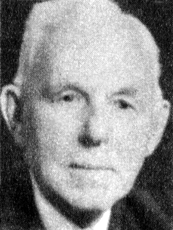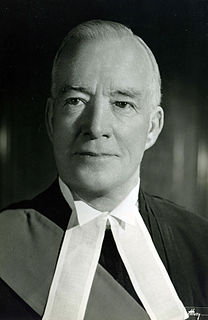William Verner Tobias (March 10, 1892 [1] – October 16, 1941 [2] ) was a lawyer and political figure in Manitoba. He represented Winnipeg from 1927 to 1932 in the Legislative Assembly of Manitoba as a Conservative member. [1]

Manitoba is a province at the longitudinal centre of Canada. It is often considered one of the three prairie provinces and is Canada's fifth-most populous province with its estimated 1.3 million people. Manitoba covers 649,950 square kilometres (250,900 sq mi) with a widely varied landscape, stretching from the northern oceanic coastline to the southern border with the United States. The province is bordered by the provinces of Ontario to the east and Saskatchewan to the west, the territories of Nunavut to the north, and Northwest Territories to the northwest, and the U.S. states of North Dakota and Minnesota to the south.
Winnipeg was a provincial electoral district in the Canadian province of Manitoba, which was represented in the Legislative Assembly of Manitoba. Consisting of the city of Winnipeg, the district originally existed from 1870 to 1883, returning a single member to the assembly. The district was named Winnipeg and St. John for the election of 1870 only, and Winnipeg thereafter.

The Legislative Assembly of Manitoba and the Queen of Canada in Right of Manitoba, represented by the Lieutenant Governor of Manitoba form the legislature of the Canadian province of Manitoba. Fifty-seven members are elected to this assembly in provincial general elections, all in single-member constituencies with first-past-the-post voting. The Manitoba Legislative Building is located in central Winnipeg, at the meeting point of the Wolseley and Fort Rouge constituencies.
He was born in Morden, Manitoba, the son of David Tobias and Venta Zimmerman, and was educated in Winnipeg and at the University of Manitoba. While in university, he gained prominence as a sprinter. Tobias served in the Canadian Expeditionary Force during World War I and was wounded at Passchendaele, receiving the Military Cross. After the war, he studied at the Manitoba Law School and established his own law practice. [2]

Morden is a city located in the Pembina Valley region of southern Manitoba, Canada near the United States border. It is about 11 km (6.8 mi) west of the neighbouring city of Winkler. Morden, which is surrounded by the Rural Municipality of Stanley. Morden is the eighth largest city in Manitoba. The city is located south of Winnipeg. The communities of Morden and Winkler are often referred to as Manitoba's Twin Cities, due to their extremely close proximity, shared services, and economic ties. According to Statistics Canada, the city had a population of 8,668 in 2016. Morden, along with the neighbouring city of Winkler, form an urban area with a population exceeding 22,000.
The University of Manitoba is a public research university in Manitoba, Canada. Its main campus is located in the Fort Garry neighbourhood of southern Winnipeg with other campuses throughout the city. Founded in 1877, it is Western Canada's first university. The university maintains a reputation as a top research-intensive post-secondary educational institution and conducts more research annually than any other university in the region.

The Canadian Expeditionary Force (CEF) was the designation of the field force created by Canada for service overseas in the First World War. The force fielded several combat formations on the Western Front in France and Belgium, the largest of which was the Canadian Corps, consisting of four divisions. The Canadian Cavalry Brigade and the Canadian Independent Force, which were independent of the Canadian Corps, also fought on the Western Front. The CEF also had a large reserve and training organization in England, and a recruiting organization in Canada. In the later stages of the European war, particularly after their success at Vimy Ridge and Passchendaele, the Canadian Corps was regarded by friend and foe alike as one of the most effective Allied military formations on the Western Front. In August 1918, the CEF's Canadian Siberian Expeditionary Force travelled to revolution-torn Russia. It reinforced an anti-Bolshevik garrison in Vladivostok during the winter of 1918–19. At this time, another force of Canadian soldiers were placed in Archangel, where they fought against Bolsheviks.
Tobias was elected to the provincial legislature in the 1927 provincial election. He was defeated when he ran for reelection in 1932. [1]
Tobias helped establish the General Monash branch of the Canadian Legion, for Jewish veterans, and served as its president until 1940. He died at Deer Lodge military hospital in Winnipeg at the age of 49 after a lengthy illness. [2]

The Royal Canadian Legion is a non-profit Canadian ex-service organization founded in 1925. Membership includes people who have served as military, Royal Canadian Mounted Police, provincial and municipal police, Royal Canadian Air, Army and Sea Cadets, direct relatives of members and also affiliated members. Membership is now also open to the general public.

